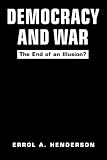Democracy and War : The End of an Illusion? / Errol A. Henderson.
Material type: TextPublisher: Boulder : Lynne Rienner Publishers, [2023]Copyright date: ©2002Description: 1 online resource (191 p.)Content type:
TextPublisher: Boulder : Lynne Rienner Publishers, [2023]Copyright date: ©2002Description: 1 online resource (191 p.)Content type: - 9781588260512
- 9781685855062
- online - DeGruyter
| Item type | Current library | Call number | URL | Status | Notes | Barcode | |
|---|---|---|---|---|---|---|---|
 eBook
eBook
|
Biblioteca "Angelicum" Pont. Univ. S.Tommaso d'Aquino Nuvola online | online - DeGruyter (Browse shelf(Opens below)) | Online access | Not for loan (Accesso limitato) | Accesso per gli utenti autorizzati / Access for authorized users | (dgr)9781685855062 |
Browsing Biblioteca "Angelicum" Pont. Univ. S.Tommaso d'Aquino shelves, Shelving location: Nuvola online Close shelf browser (Hides shelf browser)

|

|

|

|

|

|

|
||
| online - DeGruyter Electing Jesse Ventura : A Third-Party Success Story / | online - DeGruyter Multilateralism and U.S. Foreign Policy : Ambivalent Engagement / | online - DeGruyter From Reaction to Conflict Prevention : Opportunities for the UN System / | online - DeGruyter Democracy and War : The End of an Illusion? / | online - DeGruyter Ventures in Political Science : Narratives and Reflections / | online - DeGruyter Haiti's Predatory Republic : The Unending Transition to Democracy / | online - DeGruyter Toward Normalizing U.S.-Korea Relations : In Due Course? / |
Frontmatter -- Contents -- Tables -- Preface -- 1 The Democratic Peace: Strong Statistics, Weak Theory -- 2 Are Democracies Less Likely to Fight Each Other? -- 3 Are Democracies More Peaceful than Nondemocracies? -- 4 The Democratic Peace and Extrastate Wars -- 5 The Democratic Peace and Civil Wars -- 6 An Alternative Explanation of the Postwar "Democratic Peace" -- 7 The Democratic Peace: A Great Illusion? -- Appendix -- References -- Index -- About the Book
restricted access online access with authorization star
http://purl.org/coar/access_right/c_16ec
Errol Henderson critically examines what has been called the closest thing to an empirical law in world politics, the concept of the democratic peace. Henderson tests two versions of the democratic peace proposition (DPP)—that democracies rarely if ever fight one another, and that democracies are more peaceful in general than nondemocracies—using exactly the same data and statistical techniques as their proponents. In effect hoisting the thesis on its own petard, he finds that the ostensible "democratic peace" has in fact been the result of a confluence of several processes during the post–World War II era. It seems clear, Henderson maintains, that the presence of democracy is hardly a guarantor of peace—and under certain conditions, it may even increase the probability of war.
Mode of access: Internet via World Wide Web.
In English.
Description based on online resource; title from PDF title page (publisher's Web site, viewed 02. Mai 2023)


